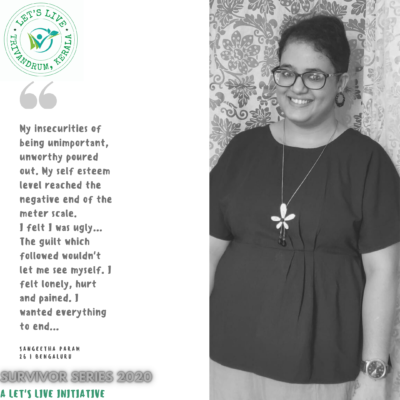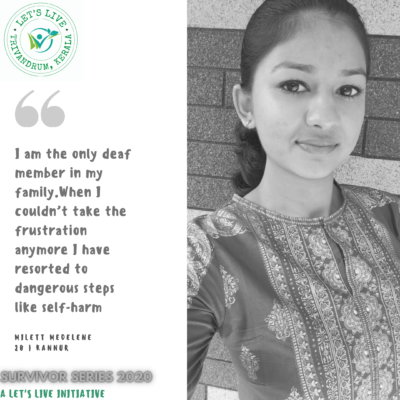As part of World Suicide Prevention Day celebrated on 10 September every year, Let’s Live held an open discussion on Breaking the myths around suicide where most common myths were discussed.
Myth: “Only adults can get truly depressed.”
Fact: Kids as young as 8 or 9 can get severely depressed. Depression is epidemic among teens today.
Myth: “Depression is a weakness.”
Fact: Depression is a serious but treatable illness that has nothing to do with moral strength or weakness.
Myth: “Only depressed kids attempt suicide.”
Fact: Kids don’t have to be clinically depressed to have suicidal feelings or to attempt suicide. Even feeling extremely “bummed out” for a relatively short period of time can lead to impulsive suicide attempts. Nevertheless, a person who is clinically depressed for longer periods of time is at higher risk for attempting suicide.
Myth: “People who are depressed always feel sad.”
Fact: Other symptoms of depression can be irritability, lack of energy, change in appetite, substance abuse, restlessness, racing thoughts, reckless behavior, too much or too little sleep, or otherwise unexplained physical ailments.
Myth: “People who talk about suicide don’t kill themselves.”
Fact: People who are thinking about suicide usually find some way of communicating their pain to others – often by speaking indirectly about their intentions. Most suicidal people will admit to their feelings if questioned directly.
Myth: “There’s really nothing you can do to help someone who’s truly suicidal.”
Fact: Most people who are suicidal don’t really want their lives to end – they just want the pain to end. The understanding, support, and hope that you offer can be their most important lifeline.
Myth: “Discussing suicide may cause someone to consider it or make things worse.”
Fact: Asking someone if they’re suicidal will never give them an idea that they haven’t thought about already. Most suicidal people are truthful and relieved when questioned about their feelings and intentions. Doing so can be the first step in helping them to choose to live.
Myth: “Telling someone to cheer up usually helps.”
Fact: Trying to cheer someone up might make them feel even more misunderstood and ashamed of their thoughts and feelings. It’s important to listen well and take them seriously.
Myth: “It’s best to keep someone’s suicidal feelings a secret.”
Fact: Never, ever keep your or someone else’s suicidal thoughts and feelings a secret – even if you’re asked to do so. Friends never keep deadly secrets!
Myth: “If someone promised to seek help, your job is done.”
Fact: You need to make sure that any suicidal person stays safe until you can help them connect with a responsible adult.
Myth: “People who complete suicide always leave notes.”
Fact: Most people don’t leave notes.
Myth: “People who die from suicide don’t warn others.”
Fact: Out of 10 people who kill themselves, eight have given definite clues to their intentions. They leave numerous clues and warnings to others, although some of their clues may be nonverbal or difficult to detect.
Myth: “People who talk about suicide are only trying to get attention. They won’t really do it.”
Fact: WRONG! Few people die by suicide without first letting someone else know how they feel. Those who are considering suicide give clues and warnings as a cry for help. In fact, most seek out someone to rescue them. Over 70% who do threaten to carry out a suicide either make an attempt or complete the act.
Myth: “Once someone has already decided on suicide, nothing is going to stop them. Suicidal people clearly want to die.”
Fact: Most of the time, a suicidal person is ambivalent about the decision; they are torn between wanting to die and wanting to live. Most suicidal individuals don’t want death; they just want the pain to stop. Some people, seeing evidence of two conflicting feelings in the individual may interpret the action as insincerity: “He really doesn’t want to do it; I don’t think he is serious.” People’s ability to help is hindered if they don’t understand the common suicidal characteristic of ambivalence.
Myth: “Once the emotional state improves, the risk of suicide is over.”
Fact: The highest rates of suicide occur within about three months of an apparent improvement in a severely depressed state. Therefore, an improvement in emotional state doesn’t mean a lessened risk.
Myth: “After a person has attempted suicide, it is unlikely he/she will try again.”
Fact: People who have attempted suicide are very likely to try again. 80% of the people who die from suicide have made at least one previous attempt.
Myth: “You shouldn’t mention suicide to someone who’s showing signs of severe depression. It will plant the idea in their minds, and they will act on it.”
Fact: Many depressed people have already considered suicide as an option. Discussing it openly helps the suicidal person sort through the problems and generally provides a sense of relief and understanding. It is one of the most helpful things you can do.
Myth: “If someone survives a suicide attempt, they weren’t serious about ending their life.”
Fact: The attempt in and of itself is the most important factor, not the effectiveness of the method.
Myth: You have to be mentally ill to think about suicide.
Fact: Most people have thought of suicide from time to time and not all people who die by suicide have mental health problems at the time of death. However, many people who kill themselves do suffer with their mental health, typically to a serious degree. Sometimes it’s known about before the person’s death and sometimes not. .
Myth:People who talk about suicide aren’t serious and won’t go through with it.
Fact: People who kill themselves have often told someone that they do not feel life is worth living or that they have no future. Some may have actually said they want to die. While it’s possible that someone might talk about suicide as a way of getting the attention they need, it’s vitally important to take anybody who talks about feeling suicidal seriously.
Myth:Once a person has made a serious suicide attempt, that person is unlikely to make another.
Fact: People who have tried to end their lives before are significantly more likely to eventually die by suicide than the rest of the population.
Myth:If a person is serious about killing themselves then there is nothing you can do
Fact: Often, feeling actively suicidal is temporary, even if someone has been feeling low, anxious or struggling to cope for a long period of time. This is why getting the right kind of support at the right time is so important.
Myth: Talking about suicide is a bad idea as it may give someone the idea to try it.
Fact: Suicide can be a taboo topic in society. Often, people feeling suicidal don’t want to worry or burden anyone with how they feel and so they don’t discuss it. By asking directly about suicide you give them permission to tell you how they feel. People who have felt suicidal will often say what a huge relief it is to be able to talk about what their experiencing. Once someone starts talking they’ve got a better chance of discovering other options to suicide.
Myth: Most suicides happen in the winter months.
Fact: Suicide is more common in the spring and summer months.
Myth: People who threaten suicide are just attention seeking and shouldn’t be taken seriously.
Fact:People who threaten suicide should always be taken seriously. It may well be that they want attention in the sense of calling out for help, and giving them this attention may save their life.
Myth:People who talk about suicide won’t really do it.
Fact:Almost everyone who attempts suicide has given some clue or warning. Don’t ignore even indirect references to death or suicide. Statements like “You’ll be sorry when I’m gone,” “I can’t see any way out,”—no matter how casually or jokingly said—may indicate serious suicidal feelings.
Myth: Anyone who tries to kill him/herself must be crazy.
Fact: Most suicidal people are not psychotic or insane. They must be upset, grief-stricken, depressed or despairing, but extreme distress and emotional pain are not necessarily signs of mental illness.
Myth: If a person is determined to kill him/herself, nothing is going to stop them.
Fact: Even the most severely depressed person has mixed feelings about death, wavering until the very last moment between wanting to live and wanting to die. Most suicidal people do not want death; they want the pain to stop. The impulse to end it all, however overpowering, does not last forever.
Myth: People who die by suicide are people who were unwilling to seek help.
Fact: Studies of suicide victims have shown that more than half had sought medical help in the six months prior to their deaths.
Myth: Talking about suicide may give someone the idea.
Fact: You don’t give a suicidal person morbid ideas by talking about suicide. The opposite is true—bringing up the subject of suicide and discussing it openly is one of the most helpful things you can do.
If you feel suicidal, seek immediate help. See a doctor or reach out to the 24 hour helpline- 1056
DISHA (Direct Intervention System for Health Awareness) by Government of Kerala Health Department- 1056 (24 hour helpline)




Comments (0)